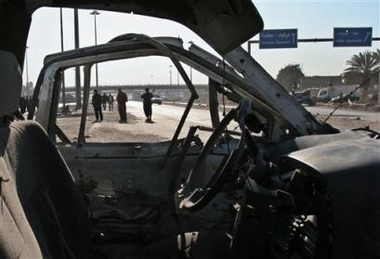|
US soldier among over 20 killed in Iraq
(AP)
Updated: 2006-02-19 10:02
BAGHDAD, Iraq - Car bombs and gunmen killed more than 20 people on Saturday
across Iraq, including an American soldier, as the government said
insurgency-related violence cost the country's vital oil industry about $6.25
billion in damage and lost revenue last year.

Iraqi policemen are
seen through a wreckage of a car following an explosion of a roadside bomb
in Baghdad, Saturday, Feb. 18, 2006. A U.S. soldier and at least 12 Iraqis
were killed in Baghdad and north of the Iraqi capital Saturday in a spate
of roadside bombings, officials said. [AP] |
British and Iraqi authorities, meanwhile, confirmed that two foreigners who
disappeared two days ago in the southeastern city of Basra were Macedonians
kidnapped on their way from the airport to the city center. The kidnappers have
demanded a ransom, officials said.
Most of the attacks Saturday were directed against the U.S. military and
Iraqi police, with civilians caught up in the violence.
The American soldier died when a roadside bomb exploded near a soccer stadium
in eastern Baghdad, the U.S. command said. It was the first death of an American
soldier since Tuesday and brought the number of U.S. personnel killed since the
Iraq war began in March 2003 to at least 2,273, according to an Associated Press
count.
Four Iraqi policemen were killed when a roadside bomb exploded near a fuel
tanker on an eastern Baghdad highway, police said. Another bomb exploded
elsewhere in east Baghdad, killing three Iraqi civilians and wounding four,
police said.
A senior Baghdad police official escaped assassination when a bomb exploded
near his convoy in the Karradah district. Brig. Abdul-Karim Maryoush was
unharmed but two police escorts died, officials said.
Elsewhere, two more Iraqi civilians were killed in a pair of roadside
bombings — one in Saddam Hussein's hometown of Tikrit, 80 miles north of
Baghdad, and another in Baqouba, 35 miles northeast of the capital.
Both bombs were intended for police patrols, officials said.
Another bomb in Fallujah, 40 miles west of Baghdad, killed a child and blew
off his brother's legs, police said.
U.S. soldiers killed three men trying to plant roadside bombs in Baghdad's
notorious Dora neighborhood, police said. At least 10 other Iraqis died in
gunfights and ambushes throughout Baghdad, police said.
The U.S. command said American and Iraqi troops found and destroyed 11
roadside bombs and three weapons caches in Baghdad in the past 24 hours.
Twenty-nine suspects were arrested, the command said.
In addition, police found the bodies of four men — bound, blindfolded and
shot to death — in three separate parts of the Iraqi capital. Their identities
were unknown and it was unclear when they died, but they appeared to be victims
of reprisal attacks by Shiite and Sunni extremists.
The Interior Ministry has announced an investigation into allegations of
Shiite death squads in police ranks after U.S. troops arrested 22 policemen
preparing to kill a Sunni Arab last month.
Also Saturday, a government official released figures showing the effects of
the insurgency on the country's oil industry, the foundation of Iraq's economy.
The industry suffered $6.25 billion in losses in 2005 due to infrastructure
sabotage and lost export revenues, Oil Ministry spokesman Assem Jihad said.
Jihad told Dow Jones Newswires that Iraqi oil installations were hit by 186
attacks last year in which insurgents killed 47 oil engineers, technicians and
workers as well as about 100 police protecting pipelines and other oil-related
facilities.
Most of the sabotage took place in northern oil installations, preventing
Iraq from exporting about 400,000 barrels a day that normally pass through
pipelines to the Turkish port of Ceyhan.
Iraq currently produces around 2 million barrels per day from its southern
and northern oil fields, down about 800,000 barrels from levels before the 2003
U.S.-led invasion.
Violence and attacks against foreign contractors also have had a devastating
effect on the economy, driving up security costs and delaying reconstruction
projects.
British and Iraqi officials said two Macedonians of Albanian ethnicity were
seized two days ago along with a Macedonian woman, who was released. The three
work for Ecolog, a German-owned Macedonian company that has a cleaning contact
at the Basra International Airport.
A $1 million ransom has been demanded for their release, a company employee
said on condition of anonymity because he was not authorized to speak to the
media.
More than 250 foreigners have been kidnapped in Iraq since 2003, including
Jill Carroll, the American reporter who was abducted Jan. 7 in Baghdad.
On Saturday, the U.S. military announced the release of about 430 male Iraqi
detainees over the past few days. Carroll's kidnappers have demanded the release
of all women detainees. The U.S. military has said the periodic releases are not
related to the kidnappers' demands.
Australia said Sunday it would likely not withdraw its troops protecting
Japanese reconstruction teams in Iraq even if the Japanese leave.
Defense Minister Brendan Nelson said if the Japanese humanitarian effort
stayed beyond May, Australians would continue to guard them, but if they left,
Australian forces could redeploy elsewhere in southern Iraq.
Australia has about 1,320 troops in Iraq and the Middle East, including
around 460 soldiers guarding the Japanese in the southern province of
al-Muthanna.
|